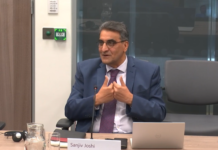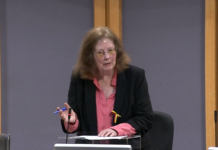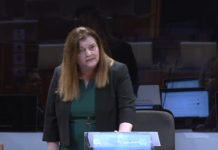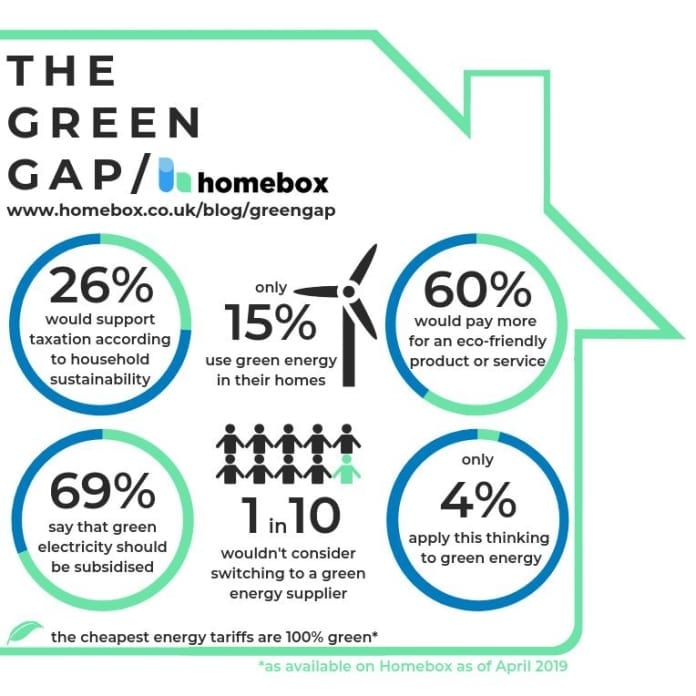MIND THE GREEN GAP
New research into the environmental attitudes and priorities of people living in Wales has identified a ‘green gap’ in our attempts to be more eco-friendly in our homes.
More people in Wales (22 percent of residents) would be prepared to be taxed according to their household sustainability levels than use green energy in their homes (10 percent), despite it being recognised as a priority in a bid to tackle climate change.
Green energy is the area where we are least likely to put our money where our mouth is. 49 percent of people living in Wales claim they would be willing to pay more for a product or service if it were better for the environment, but only one percent would use a green energy supplier that cost more than a standard supplier.
Over a third (39 percent) would need green electricity to be cheaper than their standard supplier before they would change. Over one in ten wouldn’t even consider switching to a green energy supplier, particularly older respondents, no matter the price.
Almost two thirds (62 percent) believe that green electricity should be subsidised to encourage people to use it.
In comparison to buying electricity from green energy suppliers, more people from Wales take their own reusable cups to coffee shops (13 percent), grow their own food (22 percent), holiday in the UK to avoid air miles (30 percent), collect rain water in an outside water butt for use (34 percent) or only flush the toilet when absolutely necessary (54 percent).
The research, by online household bill management platform Homebox, reveals the list of Welsh ‘green’ activities and a list of environmental priorities, with reducing the use of plastics, reducing energy use and reducing carbon emissions taking the lead.
Hedley Smith, Founder of Homebox, comments: “Unsurprisingly plastic is dominating the climate change agenda, topping the list of environmental issues that people are prioritising right now. But this masks other important steps that people could take which would have significant environmental benefits, where there is a huge lack of understanding. People still don’t seem to realise that green energy is easy to find, simple to switch to and one of the cheapest energy options for their home. In fact, all the cheapest energy tariffs currently available are 100% green*. It makes no sense to be prepared to pay more for fair trade food, but not choose to spend the same, or less on more eco-friendly energy for your home.”
When it comes to understanding the impact of their choices in the wider scheme of climate change, 42 percent of people living in Wales feel they have some understanding, but not enough, and almost two in 10 say they have almost no clue at all of how their own choices contribute to climate change.
For example, 49 percent of people claim they would switch to a green energy supplier if it cost the same as their standard supplier. The fact that green energy does cost the same, or less, but people still aren’t switching, demonstrates a clear lack of understanding.
Younger people in particular are confused and inconsistent in their approach to green activities.
According to the national statistics taken from the research, those aged 34 and under are more likely to be pessimistic about their own personal impact on tackling climate change. 76 percent of 18-34 year olds doubt the effectiveness of domestic measures such as using energy efficient light bulbs, growing your own food, or switching appliances off rather than keeping them on standby.
18 percent of Brits feel guilty about not being more sustainable, rising to 52 percent of 18-24 year olds. 20 percent of under 35s have felt self-conscious when using something they know to be bad for the environment, and this group is three times more likely to pretend to friends or colleagues that they are more sustainable than they actually are.
Younger people (aged 35 and under) are also more than twice as likely as those aged 45+ to have a disposable attitude to fashion, admitting to having thrown away clothing after three years or less. This group is also significantly more likely to have turned vegetarian or vegan in a bid to help the environment, with 21 percent of those surveyed having made this choice compared with 10 percent of the nation on average.
Hedley Smith concludes: “Climate change is one of the biggest issues of our time and as a society we aren’t doing enough about it. Our research shows that we feel guilty about climate change and even go as far as pretending to be more sustainable than we are, but none of us will want to look back and regret not having done more, when the stakes are so high. Our everyday actions can make a huge difference. We can all vote with our wallets, putting pressure on companies to do more. We live in a time where the power to make change through the use of technology, is unprecedented. Let this be the light bulb moment when we make some new, easy and effective environmental choices in our homes, such as switching to green energy.
We at Homebox want to help people become ‘greener’ in a fair and easy way. Unlike traditional price comparison websites, we help people not just switch, but to stay on the best deal for all their household bills, taking away the hassle and headache of always shopping around. Now, with green energy there are plenty of great tariffs to choose from. We have also created a list of tips to explain what other steps people can take in their own lives to really make a difference. These can be found at www.homebox.co.uk/blog/greengap.”
List of environmental priorities:
- Reducing the use of plastics
- Reducing energy use
- Reducing carbon emissions
- Recycling waste
- Saving water
- Using green energy
- Cutting food waste
- Cutting consumption of clothes
- Reducing meat consumption
List of environmental choices made in our homes:
- Installed energy efficient light bulbs
- Always turn the lights off when leaving the room
- Keeping windows closed when the heating is on
- Resell or donate old clothes
- Turn off the tap when brushing teeth
- Hang out clothes to dry instead of using the tumble dryer
- Drink tap water instead of bottled water
- Have multiple recycling collection boxes to recycle everything
- Switch appliances off rather than keeping them on standby
- Always put lids on pans cooking on the hob to save heat
- Only flush the toilet when necessary
- Put the thermostat on low during the winter and wear more warm clothes to compensate
- Collect rain water in an outside water butt for use
- Purchase fair trade items or locally produced items
- Change appliances for the most energy efficient versions
- Holiday in the UK to avoid air miles
- Use recyclable wrapping paper or brown paper to wrap presents
- Stopped buying new clothes to cut down consumption
- Grow one’s own food
- Support the installation of wind turbines or solar farms nearby
- Walk to work/children’s school
- Donate to environmental or conservation charities and causes
- Take one’s own reusable coffee cup to coffee shops
- Use solid refillable soaps and shampoos to cut down on plastic
- Buy electricity from green energy suppliers
- Banned single-use plastic from your home
- Cycle everywhere or use public transport for environmental reasons
- Share bathwater with other household members
- Have solar panels on the roof of the house
- Replaced clingfilm with beeswax film or similar alternative food covering
- Turned vegetarian
- Drive an electric car
- Turned vegan
For further information about the research or to find out how you can improve your own sustainability with some easy steps, visit www.homebox.co.uk/blog/greengap
Help keep news FREE for our readers
Supporting your local community newspaper/online news outlet is crucial now more than ever. If you believe in independent journalism, then consider making a valuable contribution by making a one-time or monthly donation. We operate in rural areas where providing unbiased news can be challenging. Read More About Supporting The West Wales Chronicle























